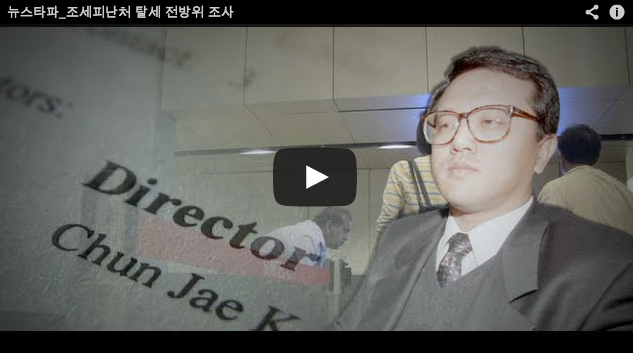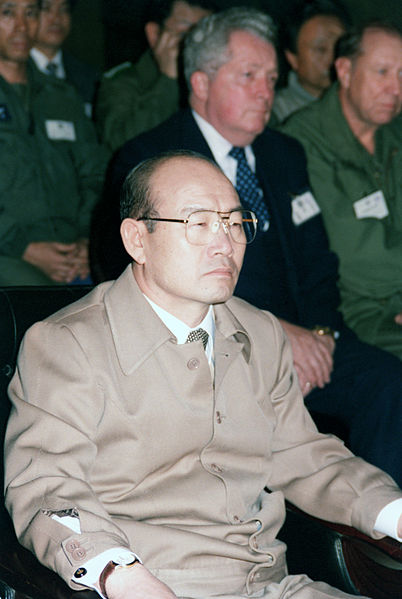State prosecutors in South Korea ransacked ex-military dictator Chun Doo-hwan and his family's residence in Seoul and hauled away expensive art work and artifacts to pay for fines that the former leader owes to the state tied to a slush fund that he collected while in power.
Prosecutors, equipped with a metal detector, raided Chun and his family houses and confiscated about 350 works of art that amount to one billion Korean won (US 89 million dollars), which one local news article explained as “enough to set up a museum” [ko]. The seizure was due to Chun's continued refusals and delays in paying fines.
He owes the state 167.5 billion Korean won (150 million US dollars) charged for a huge slush fund amassed while he was in power. Chun, however, claims to be broke.
Chun seized power in a 1979 army coup and ruled until 1988. His leadership is remembered as the darkest moments for Korea's democracy, human rights and press freedom, which was epitomized by the Gwangju Massacre (or Gwangju Democratization Movement), a tragic event in which several hundred civilians were killed by armed soldiers, though some estimates put the dead much higher at several thousand.
For his crimes, Chun was tried and initially sentenced to death, but the penalty was gradually reduced over the years to life imprisonment, then later he was pardoned and freed.
Reactions online to the raid varied from sarcastic jokes and jeers, praise as a meaningful historical event, to suspicions about the timing of the seizure:
전두환에 대한 검찰의 압수수색이 단지 미납 추징금 환수 차원이 아니길 바란다. 그는 군사반란으로 정권을 잡고 부패재산을 형성한 반역사적인 인물. 그가 당당히 전임대통령으로 예우받는 모순을 바로잡아 후손들에게 교훈으로 삼는 것, 그것이 올바른 역사다.
— 안철수를 사랑하는 모임 (@ahnsarang) July 16, 2013
@ahnsarang: I really hope the prosecutor’s raid is little more than just a way of retrieving Chun’s unpaid fines. He stands on the wrong side of history: he rose to power through a military coup and amassed dirty money. It is a bitter irony that this guy is getting all the treatment reserved for an ex-president. By correcting this irony, we will be able to write the right history which will serve as a great lesson for future generations.
전두환이가 백담사로 귀양가서 아침 저녁으로 불공드리고 법회같은 쇼를 하길래 불교에 빠진줄 알았는데 알고보니 부처님 불상도 투자로 사재기 한 것으로 드러났다. 전두환 돈으로 설립한 시공사의 창고에 고가의 미술품과 함께 보물급 불상도 처박혀 있었다.
— 서울토박이 (@bluejera) July 17, 2013
@bluejera: Chun, after self-exiling to the Baekdam temple, had regularly attended morning and afternoon prayers and services, and put on a show. [note: After he stepped down, Chun has rarely made public appearance and entered a Buddhist monastery] So I thought he made himself immersed into Buddhism, but it turns out that he even made Buddha statues another item for his hoarding. In a warehouse built by a construction company launched with his money, a national treasure-level Buddha statues were stuck inside along with other expensive art pieces.
내가 박물관장이라면 전두환 대통령 특별전 이런 걸 계획해볼듯 하다. 사람들은 전두환 씨의 미감 (…) 같은 걸 공유하고 경각심을 주자고. 벽에는 “나한테 당해보지도 않고서”이런 걸 적어놓고 — 이유세하 (@alreadyblues) July 18, 2013
@alreadyblues: If I were a museum director, I would consider opening a “Chun Doo-hwan President Special Exhibit” which would bring awareness to people by sharing Chun’s art taste. On the wall, I could display a clause “You haven't even suffered under me” [note: A reference to Chun’s notoriously tasteless joke, told to reporters back in 2008, that “I don't get why young people resent me. They haven't even suffered under me.”]
This tweet [ko], which has been retweeted more than 260 times, even refused to use the Korean honorific term for ex-president and defended articles calling him Mr. Chun Doo-hwan.
‘전직 대통령 예우에 관한 법률'이란 게 있습니다. ‘학살자 전두환'은 군형법상 반란 및 내란죄 등으로 무기징역을 선고받아 이 법에 따른 전직 대통령 예우도 받지 못합니다. ‘전두환씨'는 그에 대한 최대치의 점잖은 표현입니다. — 최성진 (@csj2007) July 16, 2013
@csj2007: There is the Former Presidents Act [that guarantees they get proper treatment and benefits]. However, since “mass murderer Chun Doo-hwan” was sentenced to a lifetime prison term for leading insurrection and rebellion, the Former President Act does not apply to him. Calling him “Mr. Chun Doo-hwan” [instead of calling him ex-president] is as generous as one can get.
However, many political bloggers and influential Twitter users explained this case is a scheme of those is power to divert public attention from the country's spy agency and the electioneering scandal it is currently embroiled in, calling Chun a decoy:
전두환네 집에 고가의 미술품이 있다는 걸 미리 알았길래 검찰은 무진동 차를 준비했을 것이다. 당연히 그 전 정권들도 전두환네 무엇이 있다 정도는 알았을 텐데, 왜 이제야 털까[…]
— 장윤선 (@sunnijang) July 17, 2013
@sunnijang: Only because prosecutors already knew that expensive art pieces are stored at Chun Doo-hwan’s house, they were able to prepare anti-vibration function cars [which were used during the raid]. Previous administrations must have known about expensive properties hidden in Chun’s house, so my question is, why did this raid take place now, at this moment? Where were they?
A journalist at Newstapa, or Korea Center for Investigative Journalism, was careful to make any early judgements. Newstapa, an independent, non-profit news site, was the first one to unearth Chun's eldest son's paper company in tax havens built for tax evasion purpose, and that revelation eventually lead to full reports on the Chun family's hidden money.

Screen capture image of Newstapa's video report on the Chun familly slush fund hidden in a tax haven.
(CC BY-NC-ND 2.0 KR)
검찰의 전두환일가 압수수색, 한판 버라이어티 쇼일까요? 정의를 세우는 첫걸음일까요? 뉴스타파가 끝까지 지켜보겠습니다
— 김용진 (@kbsmuckraker) July 17, 2013
@kbsmuckraker: State prosecutors raided Chun Doo-hwan's households. Is this just another political show event or a first step toward erecting justice? We will keep a close watch out on this till the end. Link to extensive report on “Koreans in tax havens”.







